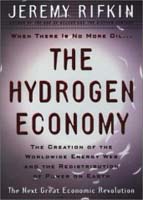
Years ago I heard of this book on NPR and was intrigued about Rifkin’s exuberence over how hydrogen power could decentralize the grid, end America’s addiction to oil, slow or lessen Global Warming and create whole new domestic industries, ergo, jobs. I was also intrigued by the science fiction element of it; hydrogen-powered vehicles were a key element in 2300 AD and Traveller.
Good thing I found it in the discount bin at Book People because it was a huge disappointment even at seven bucks. Rifkin spends 175 pages explaining the history, economics, distribution, hazards and politics of non-renewable fuels; wood, coal, oil and natural gas. Anyone who has been paying attention to current events for the last 40 years and has an IQ over 90 would say, “no duh Rifkin.” I highly doubt the book will result in changing anyone’s mind too. The Roman Empire’s rise and demise paralleling the USA’s situation with securing energy is frightening yet this comparison was dulled years ago through pundits from Pat Buchanan to Tom Hartman. Again, the potential readers have decided long before cracking his book open.
Rifkin finally gets to the exciting part about hydrogen power in the last two chapters. They are rather optimistic and anti-climatic. I wish I could share his optimism. There are a handful of new companies in conjuction with governments working toward newer, cheaper and more versatile means to harness hydrogen with solar, wind, geothermal and bio-degradeable power (the “free” categories). The energy corporations won’t allow anything to enter the equation unless they’re in control of it in my opinion, especially with either political party. Hence solar power’s acceptance and development being stunted for decades; the main reason why I constantly here the myth of “solar isn’t scalable.” As much as I despise the governor of California, I do hope the million-solar-panel initiative does succeed to debunk the critics, namely The Economist.
He we acquiring the hydrogen power he is advocating is weak; fuel cells which are really just giant batteries and not the “burning” of hydrogen. There are some liquid-fuel possibilities involved when he mentions the existing infrastructure of pipelines being converted to distribute this more abundant chemical yet fuel cells are his emphasis. I liked it when Rifkin dispels the other current mythical obstacle on creating hydrogen fuel, known as cracking. Critics of hydrogen state the same argument against ethanol using more energy than it creates. With ethanol, they are sadly valid thanks to the crops America uses (mainly corn) versus Brazil’s sugarcane. If hydrogen were cracked by using petrochemicals (usually natural gas) in a process called steam reformation, then the entropic argument against hydrogen being like ethanol is correct. However, the French cracked hydrogen from water back in the late eighteenth century through electrolysis while fossil fuel usage was in its infancy. Currently, the bulk of electricity, the key element to electrolysis, is produced through fossil fuels which supports the critics’ dismissal. Not so fast according to Rifkin. If the electrolysis were powered by the “free” energy sources of solar, wind and biomass, then hydrogen has potential. Unfortunately steam reformation remains the cheapest means with the low price of natural gas. Given time, solar, wind and biomass will cost as much per unit as fossil fuels either through expansion (the optimistic outlook) or inevitably through scarcity as the reserves dry up (the likely scenario). Which will it be? A graceful transition or the usual historical rerun humans keep repeating when the tried-and-true power source runs dry and the successor isn’t completely ready?
Overall, Rifkin’s book is an adequate primer on hydrogen power. I found his writing style likable, non-preachy and certainly not drowning in jargon which could easily happen on such a technical subject. If I were reading it on vacation, I would’ve completed it quickly because his presentation made the book enjoyable and not a chore to read. Despite how many pages he really dedicated to hydrogen power, he still makes a solid point. I also ask the naysayers of hydrogen, solar, wind and biomass; when the oil, coal, uranium and natural gas run out, what will follow?
